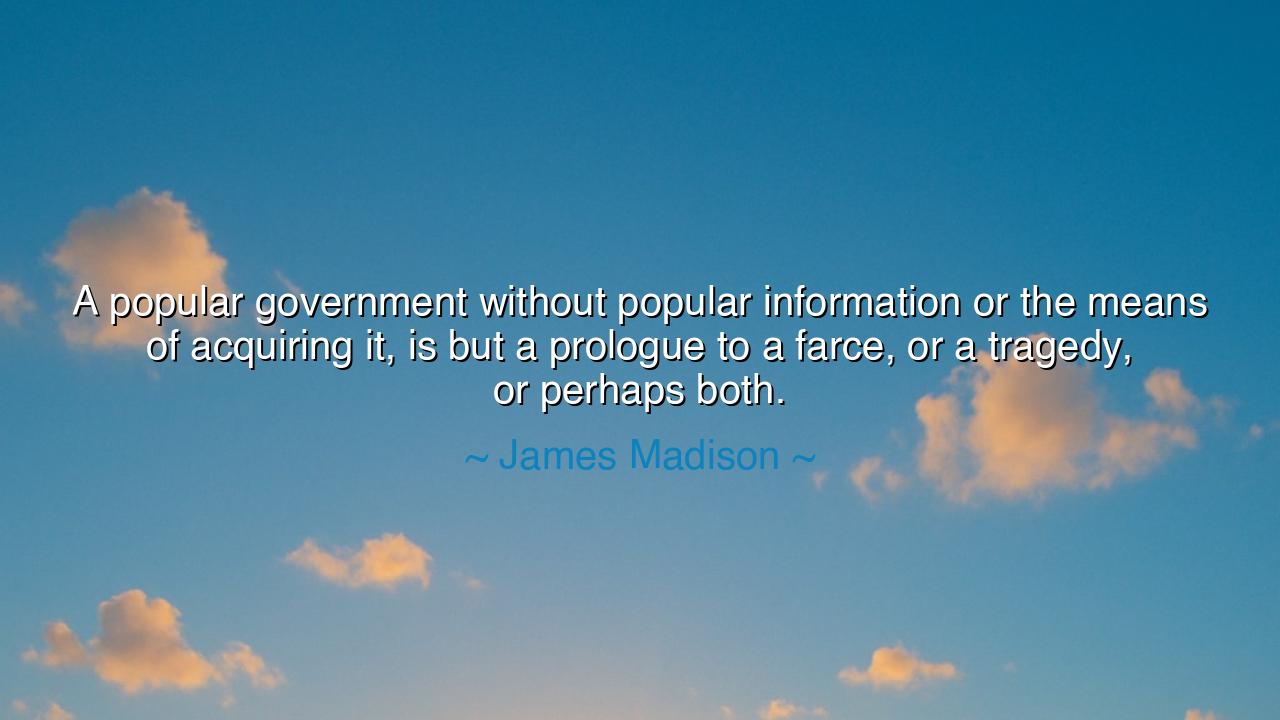
A popular government without popular information or the means of
A popular government without popular information or the means of acquiring it, is but a prologue to a farce, or a tragedy, or perhaps both.






The words of James Madison, the Father of the American Constitution, ring like a solemn warning to all who would call themselves free: “A popular government without popular information or the means of acquiring it, is but a prologue to a farce, or a tragedy, or perhaps both.” In this one sentence lies the lifeblood of democracy — the truth that knowledge is liberty, and ignorance is the seed of ruin. Madison, who helped build the very framework of representative government, saw with prophetic clarity that freedom cannot survive in darkness. A government of the people demands a people who understand, who seek truth, who are armed not with swords, but with awareness.
To grasp the meaning of this quote, one must see that Madison did not speak of information in the trivial sense — not the gossip of courts or the noise of rumor — but of truthful understanding: knowledge of laws, of rights, of public affairs, and of the moral duties of citizenship. He knew that if citizens were denied access to information, they could be easily deceived, manipulated, and ruled by shadows. A people without knowledge may still vote, but they do so blindfolded; they may cheer for liberty, yet unknowingly aid their own enslavement. Thus, Madison’s words are both a warning and a plea: that for a government to remain just and free, its citizens must be educated, vigilant, and enlightened.
The origin of this truth lies in the earliest days of the American republic. Madison had watched the birth of a new nation, and he knew how fragile it was. He understood that tyranny rarely returns in the form of kings and crowns — it returns through ignorance, when citizens become spectators instead of participants. His experience with secret councils and deceptive propaganda during the Revolutionary War taught him that truth must never be hoarded by the few. In crafting the Constitution and the Bill of Rights, he believed that the press, education, and open debate were the armor of liberty. Where truth is accessible, the people remain sovereign; where it is hidden, power decays into farce and tragedy, as he forewarned.
History confirms Madison’s wisdom with haunting precision. Consider the rise of totalitarian regimes in the twentieth century — how governments from Nazi Germany to Stalin’s Soviet Union built their strength not merely through violence, but through control of information. Books were burned, facts rewritten, voices silenced. The people were fed lies until they believed them to be truth. The results were indeed both farce and tragedy: nations destroyed by the deceit they could no longer see. And in more subtle ways, even modern democracies have fallen into similar patterns — when truth is drowned in propaganda, when media becomes the mouthpiece of power, when the people cease to question and begin to follow. Madison foresaw this danger long before it took form.
His words also speak powerfully to our present age — an age of overwhelming information, yet scarce wisdom. Today, the danger is not ignorance born of silence, but ignorance born of noise. We are surrounded by messages, yet starved for meaning. Madison’s teaching reminds us that democracy requires more than access to data; it requires discernment, the ability to seek truth amid deception. For if citizens cannot tell fact from fiction, they are as blind as those who were once denied all knowledge. The tragedy of modern times is that manipulation now comes not from censorship alone, but from confusion. To be free in such a world, one must cultivate clarity, reason, and courage.
The lesson here is eternal: freedom demands education. A nation that neglects the mind of its people will soon find its body enslaved. Every citizen, whether humble or powerful, carries a sacred duty to seek truth — to read, to question, to listen, to think. Governments, in turn, must ensure transparency, support education, and protect the voices of dissent. For the moment truth is feared or hidden, democracy becomes a hollow stage, its actors mouthing lines written by unseen hands — the very farce and tragedy Madison warned against.
And so, my child, remember: the price of liberty is not only vigilance, but understanding. Seek knowledge not as a burden, but as your birthright. Question those who rule, and question yourself as well. Cherish truth as the flame that lights the temple of democracy, and guard it against all who would dim it for their own gain. For when the people are informed, they are powerful; when they are ignorant, they are prey. Madison’s wisdom endures because it is the foundation of all freedom — that an enlightened people are the only true safeguard of a just and lasting republic.






AAdministratorAdministrator
Welcome, honored guests. Please leave a comment, we will respond soon